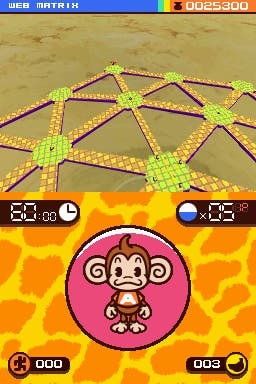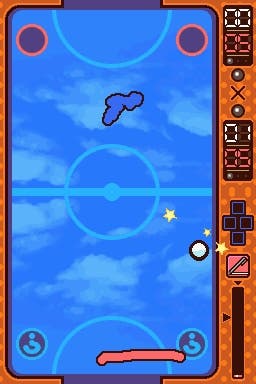Super Monkey Ball: Touch & Roll
Downward slope.
Weird and unusual control systems do funny things to me. Samba de Amigo got me excited about maracas, Sega Bass Fishing got me excited about fish, Steel Battalion made me spend £130 (or roughly £3 per button) because I was excited about WALKING, and the Nintendo DS gets me excited about absolutely bloody everything including but not limited to Animaniacs, Pac-Man and even The Urbz. This after I swore off Sims because I just couldn't bear to have to go to the toilet ANY MORE.
Hardly surprising then that I was excited about Super Monkey Ball: Touch & Roll, seeing as it's based on a game I love so much I sleep next to an inflatable Ai-Ai [he's not even lying - Ed] and a system that made me want to play a game I once actually-genuinely cried off reviewing.
The idea, obviously, is to use the stylus instead of an analogue stick to roll your little monkey-in-a-ball around mazy obstacle courses. There are 100 of them, and they're split into groups of ten. On top of that, there are six mini-games - bowling, golf, hockey, fight, race and wars (a first-person shooter, believe it or not) - and you can play them all wirelessly off of one copy of the game.
All peachy then, except actually it's not, because rather like the introduction to this review, which seemed to be banging on about peripherals and then was actually about control systems, Touch & Roll seems like it's going to be one thing (good) and then turns out to be another (average).

The problem, usefully given the four paragraphs I've written, is the controls. Whereas an analogue stick feels like sliding your thumb over the top of the ball (visualise a marble under your thumb and how you'd roll it about on a table-top - that's how the analogue controls in the console version are), the lack of tactile or visual feedback from the stylus means you pick up too much speed and tend to roll off edges, not pull up sharply enough, and generally fail to control the ball as precisely as you would on a GameCube or Xbox controller (but not PS2 - the PS2 analogue stick is the "Danny DeVito" of analogue sticks; big-headed, stumpy and unlikely to help you climb a ramp under duress).
Touch & Roll can also be played with a d-pad, mercifully, but it's not as arcade/high-score-obsessed as the famously good GBA version, Super Monkey Ball Junior., decided to be, so instead you're left doing stages in chunks of ten and either failing because of the controls or succeeding because you're a cheapskate d-pad copout.
In fact, there's worryingly little to it. Without solid challenge, and without the analogue-game-style physics-plaything option that lead to people like me spending entire evenings sat in front of the Cube or Xbox doing one level over and over for hours in a row, all that's left is the mini-games. And the majority of the mini-games are pretty poor.
Golf's alright. You point with the stylus, then drag the club back around a circular meter like a pendulum or a kid on a swing that you're ramming ball-wards with your flailing stylus, and in this way you whack the ball and try and navigate the crazy-golf course as best you can. Don't whack kids it's wrong. But it's a bit short-lived really with just one course. Bowling's also alright. You drag the ball, then choose how much spin you want, then drag the stylus up the screen in a firm, swift motion in the direction you want to bowl. But hang on - you do the spin before you bowl? That might make sense in the context of real bowling, but when you are a monkey in a ball, not being able to add the spin to make up for your lack of directional skills, like the console versions, is a bizarre oversight.

As for the others - neither Race nor Fight is remarkable. The former's speed and the latter's smack-and-giggle mechanics are offset by an overabundance of "meh"; they're not scintillating or technically exciting the way the Pilotwings-style Target (notably absent) was in the originals.
Which leaves newcomers Wars and Hockey. Wars is an FPS. It's alright. I know I've now claimed three of the games in Touch & Roll are "alright" and you're thinking, "Is he even trying?" but there really isn't anything else to add. You will vaguely enjoy it. Although not if you're left-handed, because you can only use the d-pad to move forward and strafe; there's no option for those of us who hold our stylus with the left hand. Oops. I went to the Options screen to see if I could change it and I was given the choice of viewing Rankings or Staff Credits. Those aren't even options.
Anyway, this leaves Hockey. Hockey lets you draw your own air hockey whacker thing, or gives you a normal one. As you'll know, what subtlety there is to air hockey is in feinting and trying to confuse or delude your opponent. And yes, none of this is conveyed through a game where you never see your opponent, or at least have no way of gauging what he's actually doing or pretending to do. Curses.
In other words, Super Monkey Ball: Touch & Roll is a lot of obvious ideas that fall apart in very obvious ways when you apply any thought to them or experience them yourself. It's not a bad game; curiously, neither was Monkey Ball/Marble Madness "tribute" Pac 'n Roll. But at the same time it's not a particularly good one either. It lacks so much of what made its forebears great, and at times you look at it and wonder if they thought any of it through. The staff-credits mini-game, which you see after every ten levels, is incredibly boring after about ten seconds, but lasts about four unskippable minutes and you have no way to avoid it thereafter except turning the DS off and on again. Frankly, that sums things up: solid, but not exactly clever.

